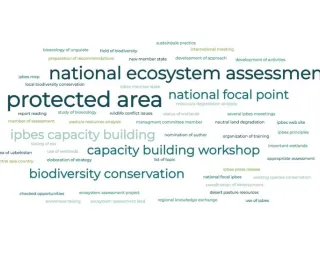Conservation, restoration and assessment of ecosystems and their services
Intact ecosystems provide people with a wide range of goods such as food, fresh water, fuels, building materials, medicines and also services such as protection against floods and soil erosion, climate regulation, carbon sinks and areas for recreation. But if ecosystems are disturbed or even destroyed, they can no longer provide the vital ecosystem services on which humans depend.
Ecosystem services und valorisation of Natural World Heritage sites
In the face of growing pressures surrounding use of UNESCO-World Heritage sites, evaluating the ecosystem services and benefits of Natural World Heritage sites and communicating these to local populations play an important role.

TEEB Russia – documentation and assessment of biodiversity und ecosystem services – the importance for national management and perspectives for international processes
Since 2013, projects conducted as part of The Economics of Ecosystems and Biodiversity (TEEB) initiative – meaning projects to assess the economic value of services provided by nature and the costs of ecosystem degradation – have been supported in the Russian Federation. As part of this process, the first-ever attempt at a nation-wide assessment of ecosystem services in Russia was published. This was then used to develop options for integrating biodiversity and ecosystem services into various policy areas (such as urban ecosystems/urban nature, peatland conservation, and pollination as the basis for agricultural output) along with initial steps towards integrating values into ecosystem accounting. In an ongoing project, the resulting methodologies are being further developed and model regions for their regional implementation identified.

Sharing experience: Sino-German workshop series on biodiversity and ecosystem services
Since 2008, Sino--German workshops on the overarching theme of biodiversity and ecosystem services have been held at regular intervals, alternating between Germany and China. The workshops form a central component of Sino-German cooperation between BfN and the Chinese Research Academy of Environmental Sciences (CRAES). So far, the focal topics covered in the workshop series have included assessment and valorisation of ecosystem services – also in connection with The Economics of Ecosystems and Biodiversity (TEEB) initiative. Restoration of ecosystems in China and Germany is another important topic.
Capacity building to provide scientific support for the IPBES in Eastern and South-Eastern Europe, the Caucasus and Central Asia.
The Intergovernmental Science-Policy Platform on Biodiversity and Ecosystem Services (IPBES) is a global knowledge platform on the topic of biodiversity and ecosystem services. Not all regions participate equally , however. To strengthen capacities in the region of Eastern and South-Eastern Europe, the Caucasus and Central Asia, and thereby increase readiness to participate in IPBES activities, BfN works with representatives from competent authorities, the science community and civil society organisations on the ground.

Urban biodiversity and ecosystem services in international cooperation
In addition to national activities in urban nature conservation, BfN has also played an active role in the area of biodiversity and ecosystem services in urban and peri-urban areas internationally, especially in China. Among other things, these activities have taken a functional approach which places the diverse functions of urban nature and green-blue infrastructure in the foreground, for example in relation to climate change adaptation and human wellbeing. In addition to integration into urban and regional planning, work has increasingly focused on strengthening subnational and local governments to aid implementation of global biodiversity goals.
